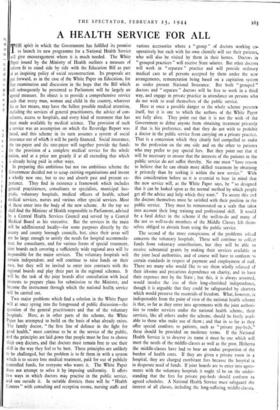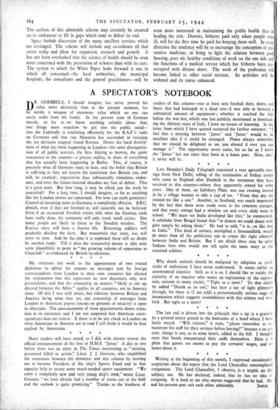A HEALTH SERVICE FOR ALL
THE spirit in which the Government has fulfilled its promise to launch its new programme for a National Health Service will give encouragement where it is much heeded. The White Paper issued by the Ministry of Health outlines a measure of reform fit to stand side by side with the Education Bill as part of an inspiring policy of social reconstruction. Its proposals are put forward, as in the case of the White Paper on Education, for free examination and discussion in the hope that the Bill which will subsequently be presented to Parliament will be largely an agreed measure. Its object is to provide a comprehensive service such that every man, woman and child in the country, whatever his or her means, may have the fullest possible medical attention, including the services of general practitioners, the advice of con- sultants, access to hospitals, and every kind of treatment that has been made available by medical science. The provision of such a service was an assumption on which the Beveridge Report was based, and this scheme in its turn assumes a system of social insurance out of which it will be partly financed. Social insurance, the tax-payer and the rate-payer will together provide the funds for the provision of a complete medical service for the whole nation, and at a price not greatly if at all exceeding that which is already being paid in other ways.
In preparing this ambitious but not too ambitious scheme the Government decided not to scrap existing organisations and invent a wholly new one, but to use and absorb past and present ex- perience. They find in existence a framework which includes general practitioners, consultants or specialists, municipal hos- pitals, voluntary hospitals, medical officers of health, school medical services, nurses and various other special services. Most of these enter into the body of the new scheme. At the top we shall find the Minister of Health responsible to Parliament, advised by a Central Health Services Council and served by a Central Medical Board as his executive. But the services in the main will be adginistered locally—for some purposes directly by the county and county borough councils, but, since their areas will not be large enough to satisfy the needs for hospital accommoda- tion; for consultants, and for various forms of special treatment, joint boards each covering a sufficiently wide regional area will be responsible for the major services. The voluntary hospitals will remain independent, and will continue to raise funds on their own, but they will be invited to enter into contracts with the regional boards and play their part in the regional schemes. It will be the task of the joint boards after consultation with local interests to prepare plans for submission to the Minister, and become the instrument through which the national health service will be carried out.
Two major problems which find a solution in the White Paper will at once spring into the foreground of public discussion—the question of the general practitioners and that of the voluntary hospitals: Here, as in other parts of the scheme, the White Paper has attempted to build on the basis of what already exists. The family doctor, " the first line of defence in the fight for good health," must continue to be at the service of the .public, and the principles are laid down that people must be free to choose their own doctors, and that doctors must remain free to use their skill in the way they feel to be best. These principles are unlikely to be challenged, but the problem is to fit them in with a system which is to secure free medical treatment, paid for out of publicly controlled funds, for everyone who wants it. The White Paper does not attempt to solve it by imposing uniformity. It offers two ways in which doctors may practise in the public service, and one outside it. In suitable districts there will be "Health Centres " with consulting and reception rooms, nursing staffs and various accessories where a " group " of doctors working co- operatively but each with his own clientele will see their patients, who will also be visited by them in their homes. Doctors in " grouped practices " will receive State salaries. But other doctors will work in " separate " practice and will provide ordinary medical care to all persons accepted by them under the new arrangements, remuneration being based on a capitation system as under present National Insurance. But both " grouped " doctors and " separate " doctors will be free to work in a third way, and engage in private practice in attendance on persons who do not wish to avail themselves of the public service.
Here at once a possible danger to the whole scheme presents itself, but it is one to which the authors of the White Paper are fully alive. They point out that it is not the wish of the Government to debar anyone from obtaining treatment privately if that is his preference, and that they do not wish to prohibit a doctor in the public service from carrying on a private practice. That is a concession which they clearly feel compelled to make to the profession on the one side and on the other to patients. who may prefer to pay special fees. But they point out that it will be necessary to ensure that the interests of the patients in the public service do not suffer thereby. No one must " have reason to believe that he can obtain more skilled treatment by obtaining it privately than by seeking it within the new service." With this consideration before us it is essential to bear in mind that the new service will, as the White Paper says, be " so designed that it can be looked upon as the normal method by which people get all the advice and help which they want." To secure this end the doctors themselves must be satisfied with their position in the public service. They must be remunerated on a scale that takes into account their long training and professional skill. It would be a fatal defect in the scheme if the well-to-do and many of the not so well-to-do members of the Middle Classes felt them- selves obliged to abstain from using the public service.
The second of the more conspicuous of the problems solved concerns the voluntary hospitals. These will continue to collect funds from voluntary contributions, but they will be able to receive substantial grants by making their services available to the joint local authorities, and of course will have to conform to certain standards in respect of payment and employment of staff. There are many who would like to see them wholly relieved of their irksome and precarious dependence on charity, and to have their expenses met by the State ; but this, it is always assumed, would involve the loss of their long-cherished independence, though it is arguable that they could be safeguarded by charters which would preserve the essentials of freedom. What, however, is indispensable from the point of view of the national health scheme is that, so far as they enter into agreements with the joint authori- ties to render services under the national health scheme, their services, like all others under the scheme, should be freely avail- able to those who make use of them ; and that in so far as they offer special comforts to patients, such as " private pay-beds," these should be provided on moderate terms. If the National Health Service is to deserve its name it must be one which will meet the needs of the middle-classes as well as the poor. Hitherto the middle-classes have had to bear an undue proportion of the burden of health costs. If they are given a private room in a hospital, they are charged exorbitant fees because the hospital is in desperate need of funds. If joint boards are to enter into agree- ments with the voluntary hospitals it ought td be on the under- standing that the fees for private pay-beds should conform to agreed schedules. A National Health Service must safeguard the interest of all classes, including the long-suffering middle-classes. The authors of this admirable scheme may certainly be counted on to endeavour to fill in gaps which tend to defeat its end.
forbids discussion of the many ancillary services which are envisaged. The scheme will include and co-ordinate all that exists today and allow for expansion, research and growth. It has not been overlooked that the science of health should be even more concerned with the prevention of sickness than with its cure. The system to which the White Paper looks forward is one in which all concerned—the local authorities, the municipal hospitals, the consultants and the general practitioners—will be even more interested in maintaining the public health than in healing the sick. Doctors, hitherto paid only when people were ill, will for the first time be paid for keeping them well. In every direction the tendency will be to encourage the conception of pre- ventive medicine, to bring to light the relation between good housing, pure air, healthy conditions of work on the one side and the functions of a medical service which has hitherto been pre- occupied with disease alone. The work of the profession will become linked to other social services. Its activities will be widened and its status enhanced.



























 Previous page
Previous page